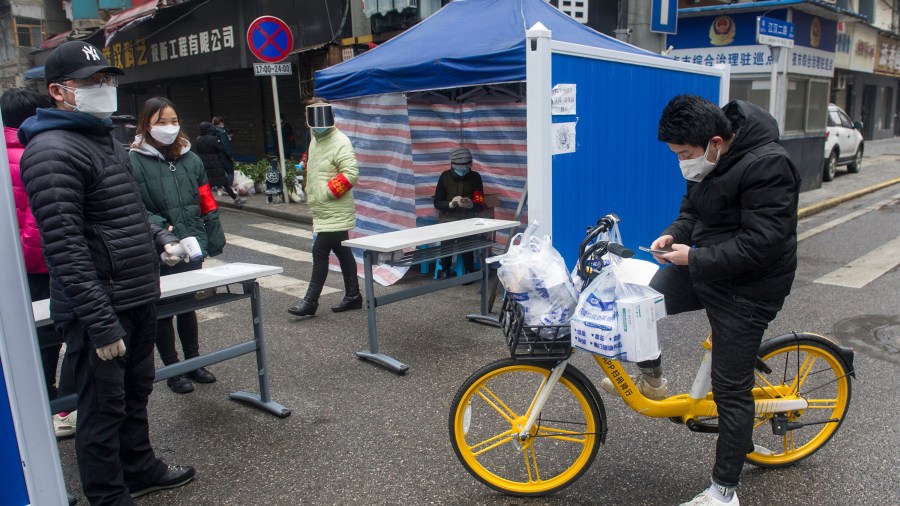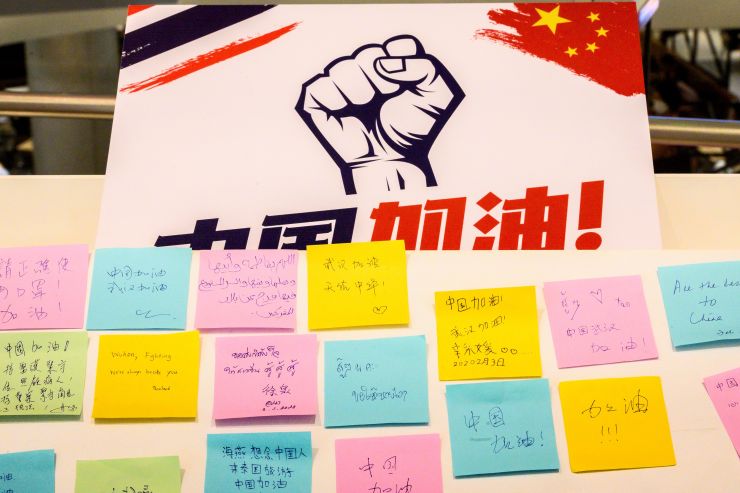Inside China’s digital war on information about COVID-19

As China tries to contain the spread of COVID-19, the disease caused by a member of the coronavirus family, it’s using a lot of tech — drones to send thermometers to buildings and apps to track cases of the virus. But China is also trying to contain the spread of information and dissent. That includes tactics like slowing down the internet and stopping, even arresting, people who are streaming information.
I spoke with Jennifer Pak, Marketplace’s China correspondent, based in Shanghai, and she told me what it’s like to live with censorship that’s both visible and invisible. The following is an edited transcript of our conversation.
Jennifer Pak: On a daily basis, when I turn on my computer, I have to not only get onto the Wi-Fi, but also turn on the [virtual private network] to access the outside web. Then I also have to log into a second VPN for our office. There was a day where it took me 40 minutes and I couldn’t even access my Gmail, I couldn’t access my work email. Coincidentally, when the internet got really bad was also the time when Dr. Li Wenliang died. His death sparked a lot of public anger, and it was around this time where the internet just got really slow.
Molly Wood: So it’s literally slow, like you see a lot of buffering, you have to wait, nothing loads, you’re not getting error messages or anything? Is it like a hope that people will just give up and stop trying?
Pak: Sort of, I mean, it comes in a variety of ways. Sometimes it could be artificial intelligence. On our WeChat Moments, sometimes you can post something on there, but you can’t forward it from a friend, or you can link to an article one day, but you can’t link to it another day. Sometimes you’re trying to get onto a news website or a news article that is from the official state media, and the internet speeds happen sometimes, like, retroactively. It’s just very confusing, and you just don’t really know, and that’s the crux of the problem.
Wood: This is frustrating in some ways, because it’s deploying tech to control the spread of information and not create more accurate flows. Is there any tech that you know of that’s being deployed to create better information or gather better information?
Pak: The government is very worried about the spreading of rumors, and certainly the people that I’ve spoken to are wary that there is a lot of bad information out there, a lot of false information. In terms of how people are bypassing it, for many, many years, people have been very clever by using homonyms or similar sounding names, words, using symbols perhaps or trying to use photos to bypass the censors to transmit this information. The problem is, as I said, it’s not clear exactly what words or terms are censored, and it could happen at different times, like maybe today this term is OK. Tomorrow it is not. It’s an ongoing thing. It’s a cat-and-mouse game.

Related links: More insight from Molly Wood
There’s a good piece in the New York Times from this week about how China’s usual propaganda tools are not working as well in the face of this disease. People don’t trust the government, and the deal that they’ve always agreed to — trading personal liberty for protection and safety — doesn’t seem like it’s working out. There’s a war online between the propaganda and the dissatisfaction.
Also watching
Facebook announced it’s canceling its big developer conference called F-8 because of the coronavirus disease. That doesn’t suggest a lot of confidence in efforts to contain COVID-19, given that F-8 is in May. Meanwhile, the Game Developers Conference scheduled for March 16 in San Francisco is still on the books, although Microsoft, Sony, Facebook and other big game companies like Unity and Electronic Arts have pulled out of the event.
Organizers of South by Southwest, which starts March 13 in Austin, Texas, have also said that the tech, film and music festival will go on as planned. Interestingly, Facebook is apparently still planning to go to South by Southwest. I guess nobody wants to miss that good Austin barbecue.
In news unrelated to coronavirus, the online gaming platform Roblox just raised $150 million for a total valuation of $4 billion. If you aren’t familiar with Roblox, my 7-year-old niece would be delighted to explain it to you. Roughly half of the children in America who are 9 through 12, and clearly plenty of younger ones, are hanging out on the Roblox platform playing various games, chatting with each other and updating their avatars. One of the general partners at Andreessen Horowitz, which led the latest round of funding, said Roblox has the potential to become “the metaverse,” as in the fictional reality in “Ready Player One,” where people spend all their time because the real world sucks. On one hand, I find this depressing; on the other hand, I guess now is as good a time as any to build these kids a virtual refuge.
The future of this podcast starts with you.
Every day, the “Marketplace Tech” team demystifies the digital economy with stories that explore more than just Big Tech. We’re committed to covering topics that matter to you and the world around us, diving deep into how technology intersects with climate change, inequity, and disinformation.
As part of a nonprofit newsroom, we’re counting on listeners like you to keep this public service paywall-free and available to all.
Support “Marketplace Tech” in any amount today and become a partner in our mission.












